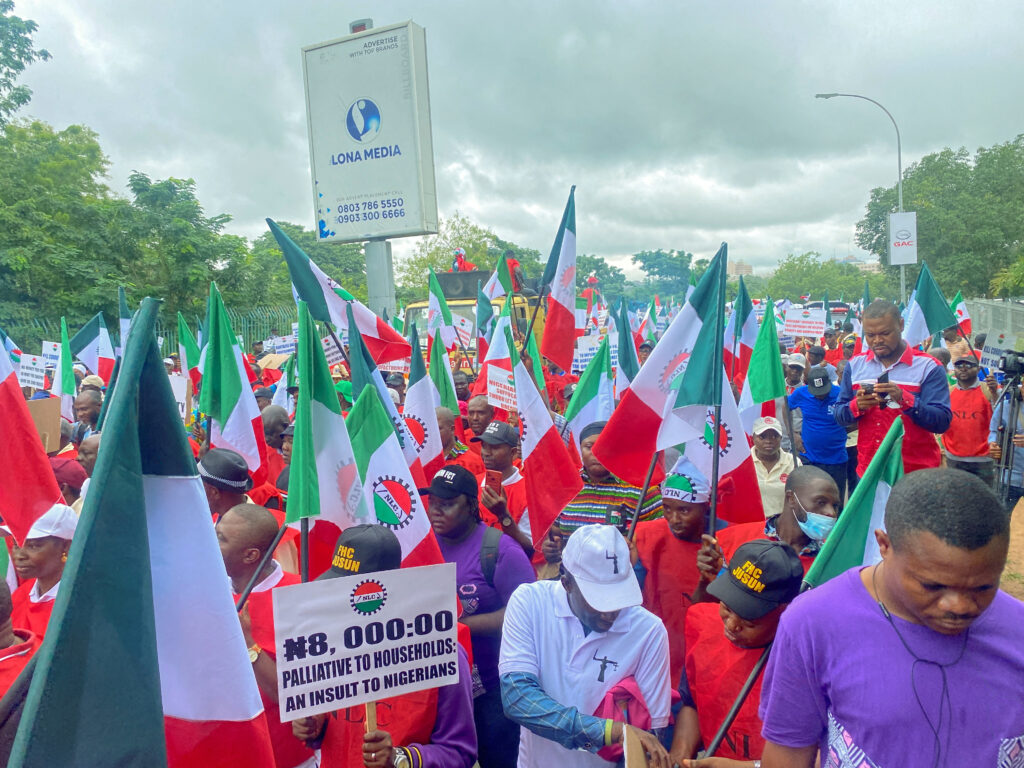On Monday night, the Nigeria Labour Congress (NLC) and the Trade Union Congress (TUC) made a joint announcement, deferring the indefinite strike slated for Tuesday, October 3, for 30 days.
The organized labour declared a nationwide strike on September 26 following the hardship caused by the removal of fuel subsidies by the Federal Government.
The strike was meant to commence today, the 3rd of October, with NLC and TUC mobilizing all the union’s affiliate bodies to comply with the industrial action.
However, in a last-minute meeting with the Federal Government, the unions decided to suspend the strike for one month after signing a 15-point Memorandum of Understanding (MOU) with the government.
In this article, Nairametrics delves into five major takeaways from the MoU between the Federal Government and NLC and TUC. The following are the main highlights of the 15-point agreements between both parties.
1. A Review of the Minimum Wage of workers Within a month
The Federal Government agreed to review workers’ minimum wage by setting up a minimum wage committee within the next month.
Presently, the Nigerian minimum wage is stated at 30,000 naira (less than 50 dollars). According to NLC and TUC, the wage is both paltry and unacceptable given the present economic conditions of the country. Responding to their protest, the Federal Government has decided to review the wages of the workers to meet the post-subsidy economic reality within a month.
The statement reads,
- “A minimum wage committee shall be inaugurated within one month from the date of this agreement.”
2. FG agrees to N100bn CNG mass transit buses
In addition to reviewing the minimum wage, the Federal Government also accepted the votes of N100 billion for the provision of high-capacity CNG buses for mass transit in Nigeria.
This initiative is set to cushion the effect of subsidy removal on public transportation, ensuring that there is a diversification in the operating cost of transportation from premium motor spirit (PMS) to compressed natural gas (CNG).
The Federal Government also agreed to provide 55,000 CNG conversion kits to kick start an autogas conversion programme.
The MoU states,
- “The Federal Government accepts to vote N100 billion for the provision of high-capacity CNG buses for mass transit in Nigeria. Provisions are also being made for an initial 55,000 CNG conversion kits to kick start an autogas conversion programme whilst work is ongoing on state-of-the-art CNG stations nationwide. The rollout aims to commence by November with pilots across 10 campuses nationwide.”#
3. Tax Incentives for Public and Private Sector
The Federal Government is also putting in place measures for tax break stimulus and incentives for both the public and private sector, primarily relevant industries whose operating cost is affected by the removal of the fuel subsidy.
Accordingly, the Federal Government has removed VAT on diesel prices for the next six months as part of their agreement with NLC and TUC.
- “Federal Government suspends collection of Value Added Tax (VAT) on Diesel for six months beginning from October 2023.“
- The Federal Government plans to implement various tax incentive measures for the private sector and the general public. “
4. Wage Awards for State Workers
As part of the agreement signed with the NLC and TUC, the Federal Government also commits to working with the state and local governments to ensure an increase in the salary of state workers across the country.
The agreement reads,
- “The Federal Government should urge the State Government through the National Economic Council and Governors Forum to implement wage awards for their workers. Similar consideration should also be given to local government and private sector workers.”
5. Fund Provision for MSMEs
The MoU also covers substantial funds for Micro and Small-Scale Enterprises.
- “The Federal Government commits to the provision of funds as announced by the President on the 1st of August broadcast to the Nation for Micro and Small Scale Enterprises. The MSMEs beneficiaries should commit to the principle of decent jobs,” it was duly noted in the jointly signed memorandum.
More Insights
The full 15-point agreements were contained in a Memorandum of Understanding (MoU) signed by the Minister of Labour and Employment, Simon Bako Lalong; Minister of State for Labour and Employment, Mrs Nkeiruka Onyejeocha and Minister of Information and National Orientation, Mallam Mohammed Idris.
NLC and TUC Presidents – Joe Ajaero and Festus Osifo, with the NLC General Secretary, Emmanuel Ugboaja and his TUC counterpart, Nuhu A. Toro signed for Labour.
The memorandum is said to be filed with the relevant Court of competent jurisdiction within one (1) week as consent judgment by the Federal Government.
Ajaero, however, stated that if the agreements were not implemented within the stipulated timeframe, the strike issue would be revisited.
